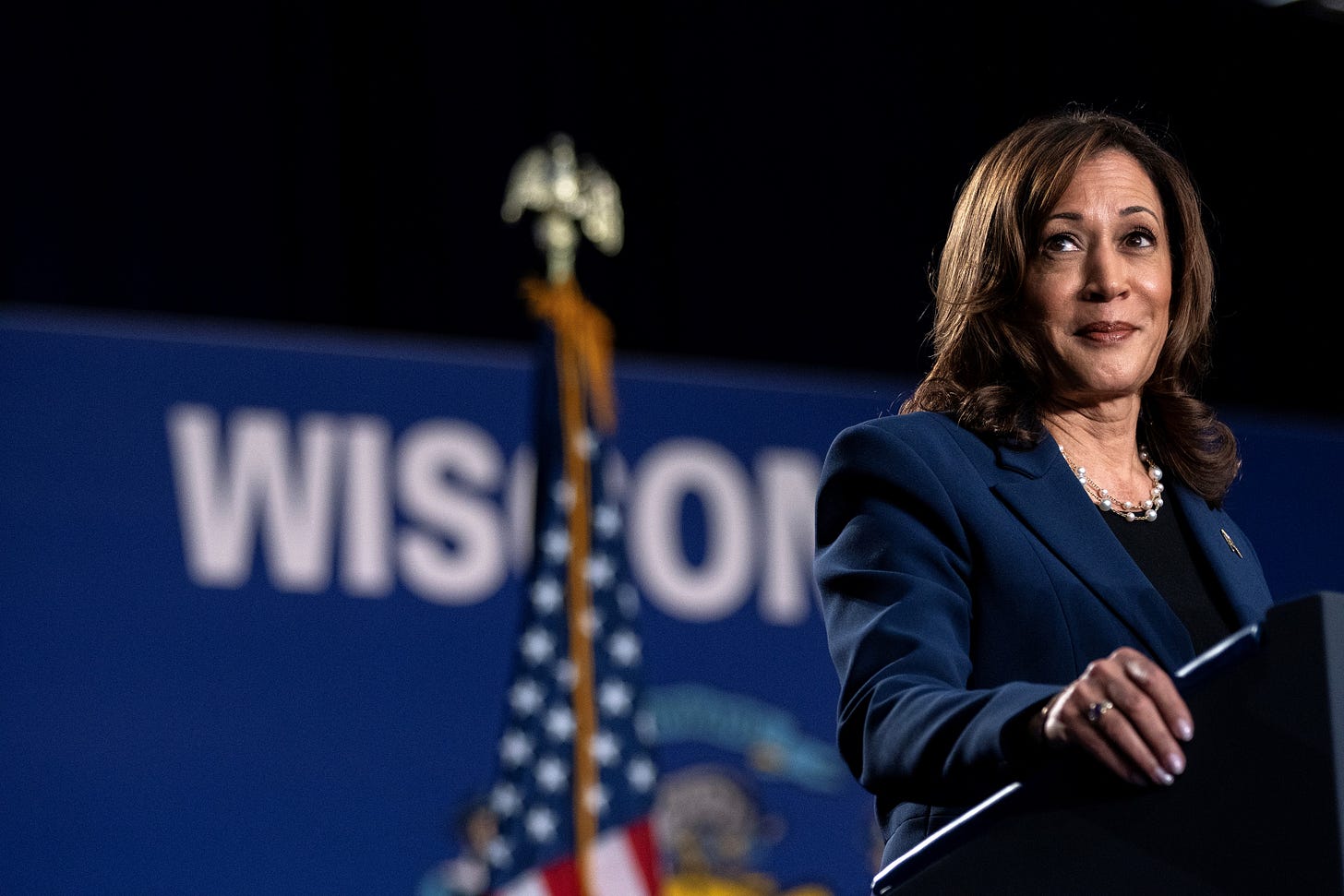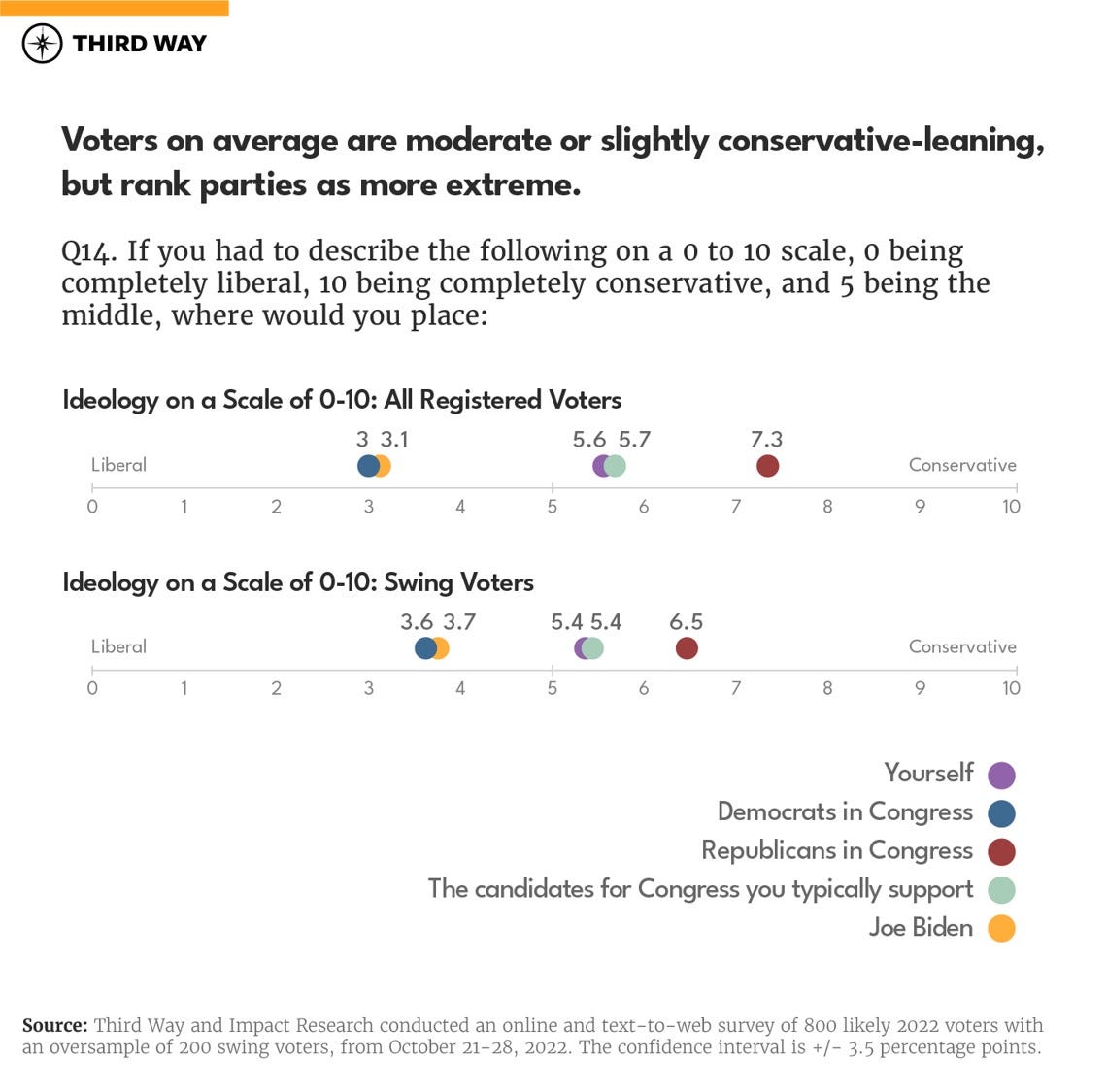Voters Aren’t Buying Harris's Pivot to the Middle So Far
The vice president is still seen as the more ideological of the two candidates.
Since launching her presidential campaign in late July, Kamala Harris has made a concerted effort to embrace the ideological middle (at least rhetorically). She has spurned more progressive views she adopted during her 2020 presidential run, such as those relating to fracking and border security. Her DNC speech heavily emphasized shared American values like patriotism, freedom, and law and order. Her campaign’s new “Issues” page primarily focuses on topics voters have routinely said matter to them, such as the cost of living, immigration, and crime.
Harris has likely attempted this pivot for a few reasons. First, the positions she took in 2019 turned out to be out of step with most voters—including even her own party’s base—leading her campaign to flame out before the first primary votes were even cast. Second, Harris seems to understand that her base is fired up and ready to turn out in November, but that getting to 270 electoral votes will require her to win voters who are not ideologically liberal and who often prioritize different issues from many Democrats.
Additionally, early in her campaign, as voters were still getting to know her better, one descriptor for Harris rose far above all others in the minds of many: “liberal.” According to a survey from Blueprint, 43 percent of voters associated that word with Harris, including a majority (51 percent) of Republicans and nearly 40 percent of independents. The next-closest term associated with her was “prosecutor,” but only 30 percent thought it was applicable.
Clearly, Harris was defined foremost by her perceived ideological bent, and she seemed to recognize a need to appeal more to the swing voters who will decide this election. However, a new Siena/New York Times poll found that, at least so far, Trump maintains an advantage over her on this front. Fully 50 percent of voters—including 60 percent of undecideds—said that Trump is “not too far” to the left or right ideologically, and only about a third said he is “too conservative.”
Meanwhile, 44 percent—a plurality—said that Harris is “too liberal or progressive” while only 41 percent said she’s neither too liberal nor too conservative. This could be a sign that the Trump campaign’s (sometimes unfocused) attacks on Harris for her past views may be starting to resonate.
Moreover, as the Times’s Nate Cohn notes, Trump’s perceived ideological moderation may be an underrated strength for him:
This is one of Mr. Trump’s overlooked advantages. Yes, he’s outside of the political mainstream in many respects—he denied the result of the 2020 election. And yes, he does have conservative views on many issues, like immigration. But he’s also taken many positions that would have been likelier to be held by a Democrat than a Republican a decade ago, like opposition to cutting entitlements, support for a cooperative relationship with Russia or opposition to free trade. It’s a reputation he’s careful to protect, from saying he doesn’t support Project 2025 to his cagey position on additional measures to restrict abortion.
Indeed, in each of the last two elections, voters appeared to back the candidate whom they viewed as less ideologically polarizing. In 2016, that was Trump. Gallup polling found that he was seen as less conservative than previous GOP nominees. Similarly, in a Pew survey, a plurality (40 percent) of voters believed he held a mix of liberal and conservative views on the issues, while nearly 60 percent thought that Hillary Clinton held liberal views on most or all issues.
But four years later, these impressions had shifted. Voters viewed Biden and Harris as closer ideologically to their ideal candidate than Trump and Mike Pence.1 In Georgia, which Biden wrested away from Trump, 24 percent of voters (including 45 percent of self-described moderates) described Biden as “moderate” compared to just 13 percent who said the same about Trump. Polling research from Monmouth University also found that voters overwhelmingly preferred candidates with moderate views compared to those who held more consistently liberal or conservative views.
In other words: the Americans likeliest to decide presidential elections tend to favor candidates who don’t veer too far left or right. This has also been evident more recently. In the 2022 midterm election, voters punished Republicans in a handful of high-profile races where the GOP ran candidates considered way too far outside the mainstream.
Following the midterm, the organization Third Way published data showing that likely voters had self-identified on average as moderate or even slightly more conservative. And, though they viewed both President Biden and the two parties in Congress as more extreme than themselves, voters on the whole—and swing voters, specifically—were unmistakably closer to Republicans than to Democrats.
Even if Harris is unable to convince voters of her moderate credentials, it’s entirely possible she will win anyway. In 2012, for example, many placed themselves closer to Mitt Romney on the ideological spectrum than they did Barack Obama, and yet Obama won anyway—in no small part because he maintained much higher levels of overall favorability than Romney did.
Still, voters in recent elections appear to be rewarding the candidates they perceive to be less ideological. Though it may not be paying clear dividends for her yet, Harris’s best bet is to continue looking for ways to win over those voters in the middle of the political spectrum and working to convince them that she is serious about her pivot toward the center.
Though it’s also notable that they saw Harris as slightly more liberal than Biden back then.






Bernie Sanders did Harris no favors this week in her quest to remake herself a moderate when he spoke, for Sanders at least, a rare truth. The Vermont self-proclaimed Democratic-Socialist said that Harris remains a bona-fide progressive who understands that she has to talk like a moderate because she wants to win the election.
The gigs up, and Sanders did not find it necessary to even master the Harris wink, nod and cackle.
Thanks Ruy. I think Harris has already lost. The voter reg shift in this country is massive: 30/30 states where we can track have moved toward Rs, with AZ, PA, FL, NV, and NC moving in a wave. AZ Rs are now up just in Maricopa Co over 162,000 adding almost 300 a day net. NC seeing the same dynamic as is PA. At the same time, the major source of Biden's 2020 win, early votes, is gone. PA is down 131,000 Ds, GA down 90% early ballot requests. NCs numbers are terrible for Ds: D ballot requests down 11 points from 20, whites out-"requesting" blacks 4:1, and new registers there are 2.1:1 R over D. PA has seen Bucks Co flip, Lucerne now at only a 300 D advantage. Most insiders I know have written of PA for Ds, which is the election---although Trump right now would be at +1 to +2 nationally, as he has traditionally in two previous elections UNDERPOLLED by 2.1%. Finally, do not underestimate the symbolic disaster that is the Haitians eating cats in Springfield, OH. I am very serious when I say this will costs Ds the "cat lady" votes. Saying "cat ladies" is one thing, but actually eating pets is another, and this is 100% on Biden/Haris.